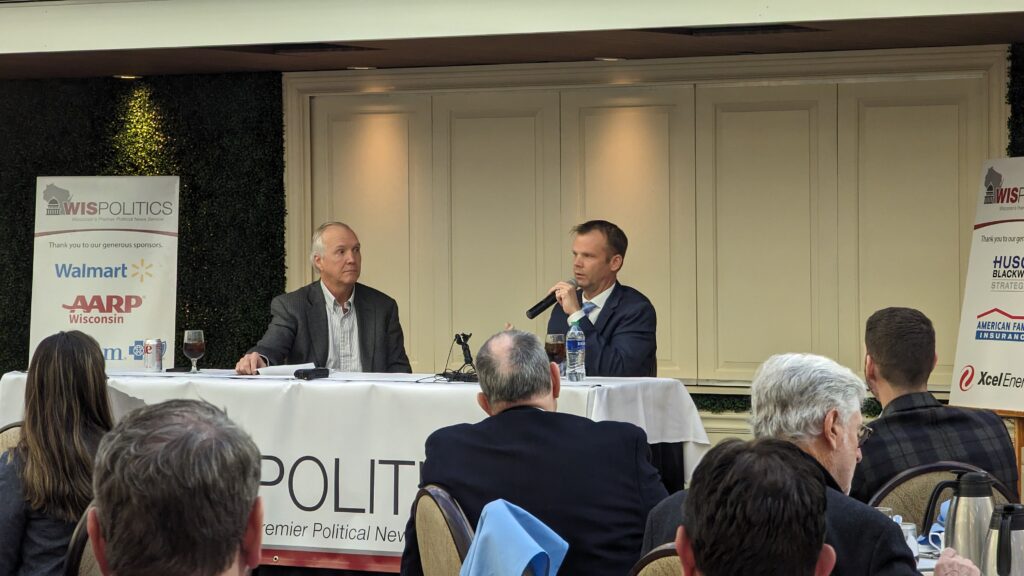Senate Leader Shoots Down Government-Run Marijuana Dispensaries
Republicans in Assembly proposed idea. Senate still working on tax cuts.

Senate Majority Leader Devin LeMahieu (R-Oostburg) at a WisPolitics event on January 11, 2024. (Baylor Spears | Wisconsin Examiner)
Senate Republicans are going to propose another tax cut in 2024 as Senate Democrats will renew conversations about supporting child care, expanding Medicaid and addressing PFAS, according to the caucus leaders.
Senate Majority Leader Devin LeMahieu (R-Oostburg) said at a WisPolitics event on Thursday that he hasn’t given up trying to get a substantial tax cut across the governor’s desk. He said that he is working with Sen. Howard Marklein on a proposal that would change the state’s second income tax bracket to include families making somewhere between $150,000 and $200,000.
Currently, Wisconsin’s income tax rates are split into four brackets. Republicans have tried several times over the legislative session to reduce rates.
First, Republicans included a nearly $3.5 billion income tax cut in the state budget, which would have condensed the tax structure to three brackets. Evers vetoed the proposal.
“Had [Evers] not vetoed it, that would’ve been my biggest highlight [of 2023],” LeMahieu commented on Thursday.
Republicans then introduced another tax cut plan later in 2023 by replacing a special session bill authored by Evers with a $2 billion tax cut measure that would have primarily given relief to single filers with incomes ranging from about $27,000 to more than $300,000 a year. That plan was also vetoed by Evers, who called it “completely unserious.”
LeMahieu said that the details of the new tax cut bill are still being worked out but that it would amount to about a $1 billion tax cut. He said that it should address previous concerns by Democrats.
Wisconsin’s second tax bracket, which sits at a rate of 4.4%, currently includes joint filers making between $18,420 and $36,840. LeMahieu wants to raise the cap to between $150,000 and $200,000.
“That’s the middle class,” LeMahieu said. “That’s the one criticism we’ve heard from the governor, that we’ve heard from Democrats… If we kept that at $200,000, in that area, that’s something that’s affordable for the state and provides some real tax relief for the vast majority of Wisconsin families,” LeMahieu told reporters.
Minority Leader Dianne Hesselbein (D-Middleton) told the Wisconsin Examiner in a year-end interview in December that she thought it would be great to give people a tax cut but that Republicans’ plans would’ve given the same type of tax cut to people making $30,000 per year and those who make $300,000.
“People making $300,000 are not in the middle class, so it was irresponsible. It would have blown a hole in the state’s future budgets and jeopardized Wisconsin’s strong financial standing, so the governor vetoed that provision that they wanted, which was good,” Hesselbein said.
In a statement to the Examiner on Thursday, Hesselbein said that she supports “providing targeted tax relief to low and middle-class earners,” and is “eager to see the specific details of Sen. LeMahieu’s plan.”
Assembly Republicans have introduced plans that would give targeted tax cuts to retirees in Wisconsin. LeMahieu said on Thursday that this plan would be picking “winners and losers.”
Medical marijuana nonstarter
Assembly lawmakers started this week by unveiling a bill that would legalize medical marijuana by opening five state-run dispensaries. While Rep. Jon Plumer (R-Lodi) said that they are aiming to get the bill done by the spring, it may face some challenges from the Senate.
LeMahieu said that the state-run dispensaries are a “nonstarter” for much of his caucus.
“A DMV for medical marijuana,” LeMahieu said. “Why would we grow the size of government?”
Specifically, the bill would create the Office of Medical Cannabis Regulation in the state Department of Health Services, which would be required to maintain a registry of patients and caregivers who could purchase medical cannabis products from one of the state-run dispensaries. Access would be limited to patients with certain medical conditions including cancer, epilepsy and HIV or AIDS.
LeMahieu also said that adding a new department within DHS seems like overkill. He pointed out that there is not currently a Senate lead author on the bill but said that they would let the bill go through the legislative process and consider it if it gets to the Senate.
Hesselbein on child care and PFAS
Hesselbein, who took over as the leader of Senate Democrats in December, said that the caucus has done a good job of listening to the will of the people throughout, especially when it came to issues like shared revenue.
While Senate Republicans will take another look at tax cuts, Hesselbein said that Senate Democrats will continue to bring attention to some of the issues that didn’t get as far as shared revenue.
Hesselbein said Senate Democrats worked well with Evers to try to get aid to child care providers, parents and business leaders. She noted Evers’ action to shift about $170 million towards the state’s Child Care Counts program so that it can continue through 2025.
“If we wouldn’t have done that, over 2,000 child care programs were going to be projected to close, then [we’d have] 87,000 children without child care and the loss of over 4,800 child care jobs,” Hesselbein said.
Hesselbein said that Senate Democrats will keep talking in 2024 about child care, protecting reproductive freedom, expanding Medicaid and enacting a comprehensive solution to PFAS, also known as “forever chemicals.”
Hesselbein said that she was excited about Evers pushing the Republican-led Joint Finance Committee (JFC) to release $125 million in budget funds to the Department of Natural Resources to fight PFAS. She said she thinks Evers has a “real solution.”
Republicans have spent the legislative session negotiating over how to structure legislation that would dictate specifics on how the funds are used. The bill passed the Senate in November without Democratic support because of concerns that the final version of the bill did too much to shield polluting businesses from liability for the environmental damage caused by PFAS pollution. The bill has not yet advanced in the Assembly.
Evers has argued that the funding shouldn’t sit around unused and needs to be used to mitigate PFAS.
“Unfortunately, the Republican bill didn’t go far enough and didn’t really trust the scientists and the Department of Natural Resources to do their job and Gov. Evers does trust scientists,” Hesselbein said. “I’m really looking forward to talking with my Republican colleagues hoping we can get this through the finish line before the end of session.”
When asked if she thinks that the Joint Finance Committee would be open to this, Hesselbein reflected on some of the legislation that has been accomplished under split government, including the shared revenue legislation that is providing about $275 million to local governments.
“When we first started talking about shared revenue a couple years ago, I never knew if that would get done,” Hesselbein said. “I’m never sure what my Republican colleagues are going to embrace and why, so I’m a very optimistic person and you know, nothing surprises me anymore.”
Senate leaders on taxes, child care and other possible legislation in 2024 was originally published by Wisconsin Examiner






















Government run? I thought that the Republicans were the ones that advocate for less government control? What a stupid “proposal.” Not to mention, the government will not allow marijuana sellers to even use traditional bank accounts like other businesses, or use credit cards.
The current RRR (radical reactionary republicans) party is not about smaller government per se. The party wants power over how government operates including defining “moral behavior for regular Wisconsin residents while putting more and more money into the pockets of their mega donors. They are in fact, fascist.
Another day ending in “Y”. Another day a GOPer dreams of taxcuts.
JFC will these clowns think of anything else besides defunding the public?